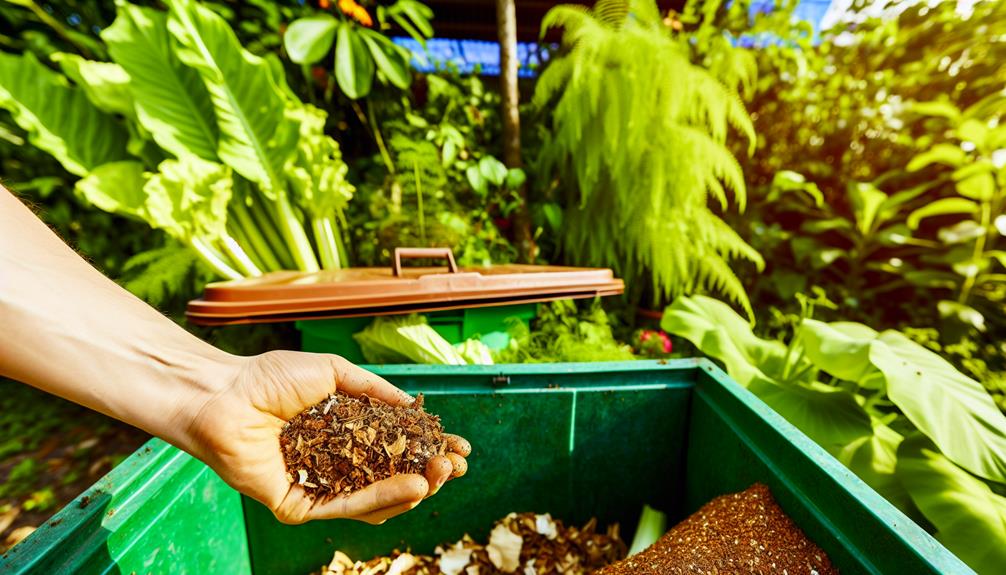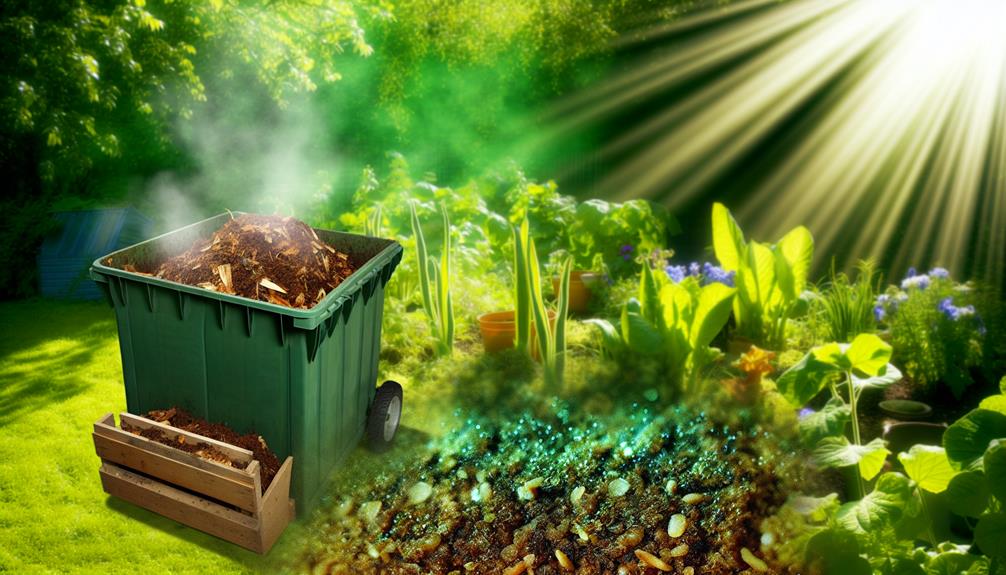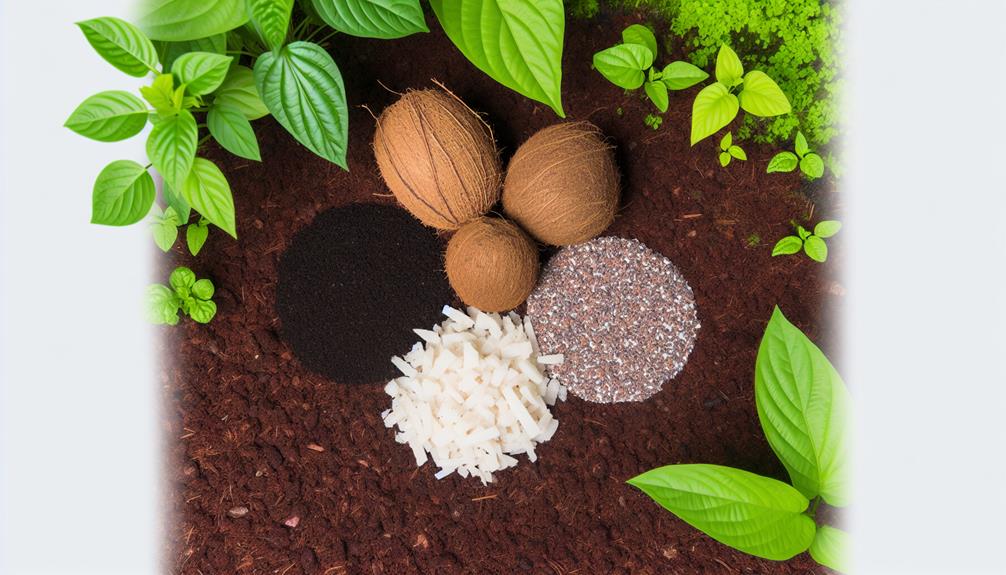

You can compost vermiculite to improve your compost pile’s moisture retention and aeration. Vermiculite, a lightweight, naturally occurring mineral, helps maintain proper aeration, preventing anaerobic conditions and odors. While it’s not a substitute for green and brown compost materials, it acts as an excellent supplement, enhancing microbial activity and overall compost quality.
Simply add vermiculite in small amounts to your compost mix to optimize its structure and efficiency. If you’re looking for alternatives, consider perlite, coconut coir, or peat moss. There are several other tips available to maximize your composting efforts.
Vermiculite is a naturally occurring mineral that’s often used in gardening and composting for its ability to retain moisture and improve aeration. This mineral has unique properties that make it valuable in various applications. Vermiculite is lightweight, fire-resistant, and non-toxic, which means it’s safe and easy to handle.
Its ability to expand when heated is one of its most distinctive traits, allowing it to hold moisture and nutrients effectively.
The extraction process for vermiculite involves mining it from natural deposits. Once mined, it’s processed through heating, which causes it to exfoliate or expand. This heating process creates the characteristic lightweight, absorbent material you see in gardening products.
Knowing where and how vermiculite is sourced can help you appreciate its role in your composting efforts.
Also Read: Can You Compost Body Wash?
In gardening, you’ll often find vermiculite enhancing soil structure by improving moisture retention and aeration. This mineral, which expands when heated, is a valuable addition to your garden soil. By incorporating vermiculite, you guarantee that your plants have better access to both water and oxygen, critical for healthy growth.
To use vermiculite effectively, mix it into your soil evenly. This practice boosts soil aeration, allowing roots to breathe and grow more robustly. Improved aeration also reduces the risk of root diseases caused by waterlogged conditions. Additionally, vermiculite’s excellent water retention capabilities mean that your plants receive a steady supply of moisture, reducing the need for frequent watering.
You can also use vermiculite in seed starting, where it helps create an ideal environment for germination. Just mix it with peat or other seed-starting mediums.
For container gardening, vermiculite is a game-changer. It enhances the potting mix by providing better drainage and moisture retention, ensuring your potted plants thrive.
Incorporating vermiculite into your gardening routine can make a significant difference. Whether you’re a novice or a seasoned gardener, you’ll find that this versatile material supports healthier, more resilient plants.
Composting is an essential technique for turning organic waste into nutrient-rich soil. It’s a simple process that can transform your kitchen scraps and yard waste into valuable compost.

To get started, you’ll need to understand the basics of the composting process and the right composting materials.
Here’s a quick guide to help you:
Also Read: Can You Compost Blood?
Adding to your composting toolkit, consider incorporating vermiculite to enhance aeration and moisture retention in your compost pile. When you include vermiculite, you’re improving the structure of your compost, which can greatly enhance its quality and efficiency. One of the notable compost benefits of using vermiculite is its ability to keep the compost well-aerated. This helps prevent anaerobic conditions that can lead to unpleasant odors and slow decomposition.
Vermiculite also excels at retaining moisture, which is vital for the microbial activity necessary for effective composting. By maintaining a balanced moisture level, vermiculite ensures that the composting process proceeds smoothly, producing rich humus faster.
Whether you’re using traditional composting methods like a compost bin or more modern approaches like a tumbler, vermiculite can be a valuable addition.
To use vermiculite effectively, sprinkle it evenly throughout your compost layers. This will help distribute its benefits uniformly. Remember, it’s not a substitute for organic matter but a supplement that can make your compost more efficient.
Also Read: Can You Compost Apple?
Why not explore a few alternatives to vermiculite that can also enhance your compost’s aeration and moisture retention? These substitutes are readily available and can offer similar benefits to your soil.

Exploring these alternatives allows you to tailor your compost to your garden’s needs. Each option provides unique benefits, whether you’re looking for better drainage, moisture retention, or enhanced soil structure.
You’re wondering if vermiculite’s harmful to pets or wildlife. Fortunately, it’s not toxic. It’s a safe soil amendment with minimal environmental impact, making it a great choice for environmentally-conscious gardeners and pet lovers like you.
You can definitely use vermiculite in container gardening. It improves soil aeration and promotes root growth, making your plants thrive. Join the community of successful gardeners who trust vermiculite for healthier, happier plants.
To store unused vermiculite, you should guarantee proper sealing in an airtight container. Keep it in a cool, dry place with a consistent storage temperature. This way, you’ll maintain its quality and always have it ready for use.
You’re wondering if vermiculite has an expiration date. Don’t worry, it doesn’t have a set shelf life. There’s no expiration indication, so you can store it and use it whenever you need in your gardening community.
You’re right to ask about health risks. Handling vermiculite can pose dangers if it’s contaminated with asbestos, leading to respiratory issues. Always check your source and wear a mask to stay safe and feel secure within our community.
To sum up, you shouldn’t compost vermiculite. It doesn’t break down easily and can disrupt the balance of your compost. Instead, use it in soil mixes or as a soil conditioner.
For composting, stick to organic materials like vegetable scraps, leaves, and grass clippings. If you need an alternative to improve aeration and moisture retention in your compost, consider using perlite or coarse sand. These materials are more compost-friendly and effective.
